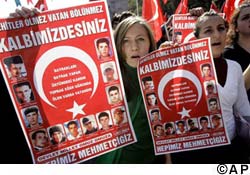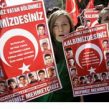
ETHNIC TENSIONS IN TURKEY CONTINUING TO ESCALATE
Publication: Eurasia Daily Monitor Volume: 4 Issue: 200
By:

Over a week after the Kurdistan Workers’ Party (PKK) killed 12 Turkish soldiers when they overran a military outpost in Daglaci, close to Turkey’s border with Iraq, (see EDM, October 22), nationalist anger inside Turkey not only shows no sign of abating but appears to be becoming ever more aggressive. Unless some way can be found to defuse the tensions, there is now a real danger of ethnic clashes and racist violence.
Turkey is no stranger to ethnic violence, pogroms, and racist killings. In January 2007, Turkish-Armenian Hrant Dink was shot dead in a racist attack. In April 2007 three Christians in the southeastern city of Malatya had their throats cut. However, violence has traditionally been directed against religious rather than ethnic minorities. But in recent years a combination of granting – mainly as the result of pressure from the EU — greater cultural rights to Turkey’s Kurdish minority and the continuing violence of the PKK has resulted in a discernible increase in racism against Kurds.
Such sentiments have, in turn, been exacerbated by the Kurds’ greater self-confidence. Twenty years ago Turkey’s Kurds did not officially exist and even speaking Kurdish risked arrest. Today, not only can Kurds openly express their ethnic identity but, as a result of mass migration from the impoverished predominantly Kurdish provinces of southeast Turkey to the metropolises in the west of the country, it is now commonplace to hear Kurdish being spoken on the streets of Istanbul, Ankara, Izmir, and Antalya. The result for Turkish nationalists has been an increasing siege mentality. For the Turkish middle-classes, ethnic prejudices have been compounded by social snobbery, as the Kurdish they hear tends to be spoken by manual laborers working on the roads and construction sites. For lower income groups, who have yet to derive any real benefit from the recent impressive growth in Turkey’s gross national product, the Kurds are a convenient scapegoat for their own poverty.
Since the recent upsurge in PKK attacks, which have killed nearly more than 40 members of the security forces in less than a month, Turkish nationalist anger has begun to be directed not just against the PKK but also against Kurds in general. Although several Turkish newspapers published details of attacks by nationalist mobs on Kurdish-owned businesses in Bursa on October 22 (see EDM, October 23), an article in the liberal daily Radikal suggests that in recent weeks such racist attacks have not only become much more widespread but are going largely unreported in the Turkish media (Radikal, October 28).
Government spokesman Cemil Cicek issued a statement calling on Turks to prevent their grief and anger at the deaths of Turkish soldiers from becoming violent, even explicitly reminding them of past pogroms against Christians and members of the heterodox Alevi community (NTV, CNNTurk, October 29).
General Yasar Buyukanit, the chief of the Turkish General Staff, has also called for restraint. However, in an official statement issued on October 28 in advance of the celebration of Republic Day on October 29, which is the official anniversary of the founding of the Turkish Republic in 1923, Buyukanit promised: “We shall make those who have caused us suffering to suffer even more” (Sabah, Vatan, Milliyet, Hurriyet, October 29).
Although it was undoubtedly not his intention, there are many in Turkey who will have interpreted his words as being directed not just against the PKK but also against Kurds in general.
Expectations that the demonstrations and protest marches that followed the October 21 attack would gradually decline have proved unfounded. On October 27 hundreds of thousands of Turks staged anti-PKK demonstrations across the country, including an estimated 300,000 in the central Anatolian city of Kayseri (Radikal, Milliyet, Vatan, October 28). On October 28, the annual Eurasian Marathon in Istanbul turned into a nationalist rally as thousands of runners carried Turkish flags and chanted anti-PKK slogans (Vatan, Hurriyet, Sabah, October 29). At times the mood has become almost hysterical. During an anti-PKK rally in the Mediterranean resort of Bodrum, one of the protestors turned up with his dog, both of which were wearing tee shirts with “Turk” written on them. The protestor’s intention appears to have been to affirm his dog’s nationalist credentials. But after a furious reaction from the Turkish press, the local governor has ordered the man’s arrest and prosecution on charges of insulting the Turkish nation by suggesting that it was a dog (Vatan, October 29).
Many Kurds have been so alarmed by the possibility of becoming victims of ultranationalist violence that they have hung Turkish flags from their homes and workplaces (Radikal, October 28). However, hard-line supporters of the PKK are refusing to be cowed. On the evening of October 28, 60-100 PKK supporters clashed with police in the Sisli neighborhood of Istanbul (NTV, CNNTurk, October 29). Although the demonstration was relatively small, there are concerns that, if and when Turkey launches a cross-border military operation into northern Iraq, PKK supporters in cities inside Turkey will attempt to stage violent protests that could, in turn, trigger an even more violent Turkish nationalist response.




